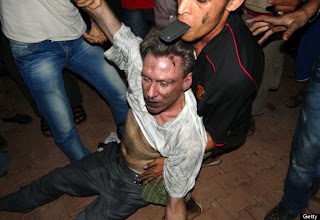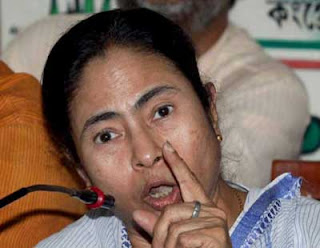ஒரு திரைப்படம் இன்று உலகத்தையே உலுக்கிவிட்டிருக்கின்றது.
உலகெங்கும் 800க்கும் மேற்பட்ட நகரங்களில் கண்டன ஆர்ப்பாட்டங்கள் நடந்திருக்கின்றன. இந்த நாள் வரை ஐம்பது பேர் உயிரிழந்திருக்கின்றார்கள்.
எல்லாமே யாருக்காக? எல்லாமே எதற்காக?
முஹம்மத் நபிக்காகத்தான் இத்தனை ஆர்ப்பாட்டங்களும் கொந்தளிப்புகளும்.
முஹம்மத் நபி என்றால் யார்? என்ன அது, 1400 ஆண்டுகளுக்கு முன்பு அரேபியாவில் வாழ்ந்த வாழ்க்கை வழிகாட்டியா? இத்துணை நூற்றாண்டு-கள் உருண்டோடி விட்ட பிறகுமா, மக்கள் அவரை மறக்காது இருக்கின்றார்கள்? இத்துணை ஆண்டுகளுக்குப் பிறகுமா மக்கள் அவருக்காக தங்களின் உயிரையே கொடுக்கின்றார்கள்?
யார்தான் அவர்? எப்படிப்பட்டவர் அவர்? அவர் செய்த சாதனைகள் என்ன? அவர் சந்தித்த சோதனைகள் என்ன? போன்ற கேள்விகள் இன்று உலகெங்கும் மக்கள் மத்தியில் உரத்துக் கேட்கப்படுகின்றன. உங்களுக்குள்ளும் இந்தக் கேள்விகள் எழுந்திருக்கலாம்.
அந்தக் கேள்விகளுக்கு விடைதான் இந்த மடக்கோலை.
யார் முஹம்மத் (ஸல்)?
இறைவனிடமிருந்து இத்தரணியில் வாழ்ந்த, வாழ்கின்ற, வாழப் போகின்ற உலக மக்கள் அனைவருக்காகவும் அருளப்பட்ட இறைத்தூதர்தாம் முஹம்மத் நபி(ஸல்). மனித குல மாணிக்கமாக, அகிலங்களுக்கெல்லாம் அருட்கொடையாக வாழ்ந்து சென்றவர்தாம் அண்ணல் நபிகளார்(ஸல்).
‘பணம், குலம், அழகு ஆகியவற்றைப் பார்த்து மணம் முடிக்காதீர்கள். மார்க்கத்தைப் பார்த்தே பெண்ணை மணம் முடித்துக் கொள்ளுங்கள்’ எனச் சொல்லி அமைதியான
மணவாழ்வுக்கு அடித்தளம் அமைத்துக் கொடுத்தவர்.
‘அரபி அல்லாதவரை விட அரபியோ, அரபியை விட அரபி அல்லாத-வரோ சிறந்தவர் அன்று. உங்களில் எவர் இறையச்சம் மிக்கவரோ அவரே உங்களில் சிறந்தவர்’ என்றும், ‘பிறரைக் கீழே வீழ்த்திவிடுபவன் பலசாலி அல்ல. கோபம் வரும்போது தன்னை அடக்கிக் கொள்பவனே பலசாலி’ என்றும், ‘பொறாமை நற்செயல்களை அழித்துவிடும்’ என்றும் ஏராளமான நல்லுரைகளைச் சொல்லி அமைதியான
சமூகத்திற்குப் பாதை அமைத்துக் கொடுத்தவர்.
‘மோசடி செய்பவன் என்னைச் சேர்ந்தவன் அல்லன்’ என்றும் ‘உழைப்-பாளியின் வியர்வை உலரும் முன் அவருக்குரிய கூலியை கொடுத்து-விடுங்கள்’ என்றும் கூறி, தூய்மையான
பொருளாதார நடைமுறைகளுக்கு வித்திட்டவர்.
‘சமூகத்தின் தலைவன் சமூகத்தினரின் தொண்டனாவான்’ என்றும் ‘பதவியை விரும்புகின்றவர்களுக்கு பொறுப்புகளைத் தராதீர்’ என்றும் தீர்க்கமான கட்டளைகளைத் தந்து உன்னதமான
அரசியல் வாழ்வுக்கு வழிகாட்டியவர்.
உயர்குலப் பெண் திருட்டுக் குற்றத்துக்கு ஆளாகி தண்டனை-யும் விதிக்கப்பட்ட நிலையில் அவளுக்காக தோழர்கள் பரிந்து பேசியபோது ‘ஆளுக்கொரு நீதியைக் கடைப்பிடித்த சமூகங்கள் அழிந்து போனது உங்களுக்குத் தெரியவில்லையா? என் மகள் பாத்திமாவே தவறிழைத்தாலும் அவளையும் தண்டிப்பேன்’ எனச் சூளுரைத்து
நீதிக்கு உறுதியளித்தவர்.
என அண்ணல் நபிகளாரின் சிறப்புகளைச் சொல்லிக் கொண்டே போகலாம்.
அவரைக் குறித்து இறைவனே ஒரே வரியில் அறிமுகப்படுத்தி-யிருக்கின்றான்.
மேலும், திண்ணமாக நற்குணத்தின் மிக உன்னதமான நிலையில் நீர் இருக்கின்றீர். (திருக்குர்ஆன் 68 : 4)
உண்மை. முற்றிலும் உண்மை. அண்ணல் நபிகளார்(ஸல்) அழகிய குணங்களைக் கொண்டவராகத்தான் இருந்தார். இதற்கு அவருடன் வாழ்ந்த அவரின் மனைவியரும், தோழர்களுமே சான்றளித்திருக்கின்-றார்கள்.
அவற்றின் விவரம் வருமாறு:
அண்ணல் நபிகளாருடன் இருபத்தைந்து ஆண்டுகள் இல்லற வாழ்வு நடத்தியவர்
அன்னை கதீஜா(ரலி). முதன்முதலாக இறைவ-னிடமிருந்து வசனங்கள் அருளப்பட்ட போது பயந்து வியர்த்து விதிர்த்து வந்த அண்ணல் நபிகளாரைப் பார்த்து அன்னையார்(ரலி) சொன்ன வாசகங்களைப் பாருங்கள்:
“இறைவன் மீது ஆணையாக! இறைவன் உங்களை எந்தக்-காலத்-திலும் வேதனையில் ஆழ்த்த மாட்டான். நீங்கள் உறவுகளை மதித்தும், அவர்களின் தேவைகளை நிறைவேற்றியும் வாழ்கின்றீர்-கள். கடனாளிகளின் கடன் சுமையைப் போக்குகின்றீர்கள். ஏழைகளுக்கும் எளியவர்களுக்கும் தேவையுள்ளவர்களுக்கும் உதவுகின்றீர்கள். விருந்தினர்களை உபசரிக்கின்றீர்கள். உண்மைக்கும் சத்தியத்திற்கும் தோள் கொடுக்கின்றீர்கள். துன்பத்தில் உழல்கின்ற மக்களின் துயர் துடைக்கின்றீர்கள்.”
அண்ணல் நபிகளாரின் இன்னொரு மனைவி அன்னை ஆயிஷா(ரலி). அண்ணல் நபிகளாரின் மரணம் வரை அவருடன் இருந்தவர். அவர்கள் சொல்வதைக் கேளுங்கள். “அண்ணல் நபிகளார்(ஸல்) எவரையும் எந்தக் காலத்திலும் திட்டியதில்லை. தனக்குத் தீங்கிழைத்தவர்களை மன்னித்து அவர்களுக்கும் நன்மையையே செய்து வந்திருக்கின்றார். சொந்த விவகாரங்களில் எவரையும் பழிக்குப் பழி வாங்கியதில்லை. எந்தவொரு முஸ்லிமையும் அவர் சபித்ததில்லை. எந்தவொரு பணியாளரையும் பணிப்பெண்ணையும் கை நீட்டி அடித்ததில்லை.”
அண்ணல் நபிகளாருடன் 23 ஆண்டுகள் இறைவழியில் இணைந்து பாடுபட்ட உற்ற தோழர்தாம் அலீ பின் அபூதாலிப் (ரலி). அண்ணல் நபிகளாருடன் பயணத்திலும் போரிலும் வணக்க வழிபாட்டிலும் ஆலோசனைக் கூட்டத்திலும் இணைபிரியா நண்பராக வாழ்ந்தவர்தாம்
அலீ பின் அபூதாலிப்(ரலி). அவர் கூறுகின்றார்: ‘அண்ணல் நபிகளார்(ஸல்) மென்மையானவர். இளகிய மனம் கொண்டவர். எந்தக்காலத்திலும் கடுமையாக நடந்துகொண்டதில்லை. மிகவும் பரந்த மனம் கொண்டவர். ஓங்கிப் பேசமாட்டார். எந்தக் காலத்திலும் அவருடைய நாவிலிருந்து கெட்ட வார்த்தைகள் வந்ததில்லை. எவருடைய குறையையும் துருவித் துருவி ஆராய்ந்ததில்லை. வீண் விவாதம், அதிக பேச்சு, பயனற்ற பொழுதுபோக்கு ஆகிய மூன்றிலிருந்தும் அறவே விலகியிருந்தார்.”
அண்ணல் நபிகளாரின் தோழர்களில் ஒருவர் அனஸ் பின் மாலிக் (ரலி). அண்ணல் நபிகளாரின் பணியாளராய் பல்லாண்டுகள் இருந்தவர்.
அவர் கூறுகின்றார்: ‘நான் அண்ணல் நபிகளாரின் பணியாளராகப் பத்து ஆண்டுகள் சேவையாற்றியிருக்கின்றேன். அவர் ஒரு நாள் கூட என்னைப் பார்த்து ‘சே..’ என்று கூட சொன்னதில்லை. அவர் சொன்ன வேலையைச் செய்ய மறந்துவிட்டாலும், அல்லது செய்யத் தவறிவிட்டாலும்கூட அவர் என்னைப் பார்த்து ‘ஏன் இப்படி நடந்து கொண்டாய்?’ என ஒரு வார்த்தை கேட்டது கிடையாது.’
அண்ணல் நபிகளாரின் அழைப்பை எதிர்ப்பதில் முன்னணியில் நின்ற
அபூசுப்யான் ரோமப் பேரரசரிடம் அண்ணல் நபிகளாரைக் குறித்துச் சொன்னதாவது: ‘முஹம்மத் பொய் சொல்லி நான் பார்த்ததில்லை. அவர் எந்தக்காலத்திலும் கொடுத்த வாக்குறுதியை மீறியதில்லை. ஒப்பந்தத்தை உடைத்ததில்லை.’
இந்தச் சான்றுகள் தருகின்ற செய்தி என்ன?
இன்னொன்றையும் கேளுங்கள். அண்ணல் நபிகளார்(ஸல்) தம் வாழ்நாள் முழுவதிலும் ஒருவரைக் கூட
கட்டாயப்படுத்தி மதமாற்றம் செய்ததாக வரலாறு கிடையாது.
கைதிகளாகப் பிடிபட்டவர்கள், அடிமைகள், பணியாளர்கள், ஏழைகள் ஆகிய பலவீனமான மக்களிடமும் அவர் இஸ்லாத்தைத் திணித்ததில்லை. அண்ணல் நபிகளாரை வளர்த்துப் பாதுகாப்பு அளித்த அவருடைய பெரிய தந்தை
அபூதாலிப் இறுதிவரை இஸ்லாத்தை ஏற்காமலேயே மரணித்தார்.
அவருடைய நெருங்கிய உறவினர்களில் பலர் இஸ்லாமியப் பிரச்சாரம் தொடங்கிப் பல ஆண்டுகளுக்குப் பின்னர்தான் இஸ்லாத்தைத் தழுவினார்கள். இஸ்லாத்தில் இணைந்தவர்கள் தங்கள் பிள்ளைகளைக் கட்டாயப்படுத்தி இஸ்லாத்தில் இணைக்க அண்ணலாரிடம்
அனுமதி கோரிய போது அதனை மறுத்தார்.
அதுமட்டுமல்ல, மக்கா நகரம் அண்ணலாரால் வெற்றி கொள்ளப்பட்டபோது, தமக்கும் தம் குடும்பத்தினருக்கும் துன்பங்கள் அளித்த மக்காவாசிகளை மனப்பூர்வமாக
மன்னித்த மாண்பாளர் அவர்.
பகைவரையும் மன்னித்த அந்தப் பண்பாளரைப் பற்றி,
மென்மைக்கு அடையாளமாய் வாழ்ந்த அந்த உத்தமரைப் பற்றி,
இளகிய மனமும் ஒழுக்கசீலமும் படைத்த அந்த மாமனிதரைப் பற்றி,
கனிவும் கருணையும் கொண்ட,
வாழ்நாளில் எவரையும் பழி வாங்காத அந்த உயர்ந்த தலைவரைப் பற்றி இன்னும் இன்னும் தெரிந்து கொள்ள வேண்டுமே என உங்கள் மனம் பரபரக்கின்றதா?
தொடர்பு கொள்ளுங்கள்:
ஜமாஅத்தே இஸ்லாமி ஹிந்த்தமிழ்நாடு & புதுச்சேரி
138, பெரம்பூர் நெடுஞ்சாலை, சென்னை - 600 012
Phone : 044 -2662 1101, Fax : 2662 0682
Tel : 044 -2662 1101, Fax : 2662 0682
Email : jihtnzone@gmail.com, Website :
www.jihtn.org


















 ,
who was hosting the Prophet [saws] and his companions within his own
home so that they would have a place to pray and a place to learn and a
place to congregate. This is the famous dar'l-Arqam (the house of
Arqam).
,
who was hosting the Prophet [saws] and his companions within his own
home so that they would have a place to pray and a place to learn and a
place to congregate. This is the famous dar'l-Arqam (the house of
Arqam). . He was the first person to pray publicly by the side of the Prophet
. He was the first person to pray publicly by the side of the Prophet  .
. grant us the proper understanding of who the Prophet
grant us the proper understanding of who the Prophet